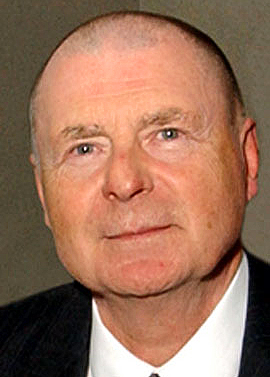Alumnus Richard Heck wins Nobel Prize in chemistry

Richard Heck
By Samantha Masunaga
Oct. 13, 2010 1:57 a.m.
For a Nobel Prize winner, Richard Heck seems to lead a relatively normal life.
The 79-year-old UCLA alumnus and professor emeritus at the University of Delaware is retired and currently lives in the Philippines with his wife. In his spare time, he grows orchids, a hobby he’s been interested in since he was 12.
But even though he won the award for discovering a chemical reaction now heavily used in the creation of complex molecules for pharmaceutical drugs, Heck isn’t about to extend his scientific repertoire to plant breeding.
“I just like to see the flowers,” he said, adding that he would leave hybridization to professional growers. “I grow a number of different species, but nothing special.”
It was in this same calm tone of voice that Heck also spoke about his recent prize awarded to him on Oct. 6, the reward for his years of research in the late 1960s.
“It was rather surprising after all this time. I had kind of given up on it, so it was a nice surprise,” he said, adding that he did not think he would still be considered for the honor since he had not done research recently. “I thought I was too old.”
This modest reaction corresponds with friends’ descriptions of Heck as an “ordinary guy” and a “nonpolitical scientist.”
But for organic chemists around the globe, what has become known as the Heck reaction is now one of the most important tools to create carbon-carbon bonds between alkenes, a compound containing at least one carbon-carbon double bond, and aryl halides, aromatic rings with a single attached halogen atom.
The reaction forms these new bonds by joining common molecules together, a process called cross-coupling, said Kendall Houk, a UCLA professor of chemistry and biochemistry. Through the assembly of carbon atoms, chemists can make chains that lead to a variety of different structures known as the molecules of life.
“There are only a handful of reactions that are used so often to make so many things,” said Neil Garg, an assistant professor of chemistry and biochemistry at UCLA, adding that the reaction is used on a multiton scale for industrial applications. “It’s a tool everybody uses all the time.”
While the idea of the reaction seems deceptively simple, its implications are huge.
“Certainly before the Heck reaction and coupling, the way people did these things was certainly more complicated,” Houk said, adding that the reaction makes synthesis more efficient, as it uses less reactions and yields more product.
But the current consensus on Heck’s research was not always this way.
Heck’s initial interest in chemistry began in his early teens, after he read books on the topic and developed an interest in organic chemistry.
He continued to follow this interest throughout high school and into his undergraduate education at UCLA, as he took part in research with a faculty mentor.
“I enjoyed the complexity of it and the way you can make all sorts of compounds,” Heck said. “It was quite a versatile area.”
After receiving his bachelor’s degree in 1952, Heck pursued postdoctoral studies at the university under the instruction of Saul Winstein, a chemistry professor who specialized in physical organic chemistry studies, Houk said.
Together, Heck and Winstein published about 11 scientific papers on their research from 1952 to 1964.
Eventually, Heck began to experiment with palladium, an element that was key to getting the Heck reaction to occur. Over time, Heck said he developed the idea of the reaction and finalized it during his early days as a professor at the University of Delaware in the late 1960s.
But the usefulness of the reaction was not fully understood for some time, and Heck’s research funding dried up just as he was developing new ideas, said Doug Taber, professor of chemistry at the University of Delaware and one of Heck’s colleagues.
Heck retired from the university in 1989 and cited the lack of funding as one of the factors in his decision.
But Heck’s ideas began to become more well-known after he retired.
“People started to use (the reaction) a little bit and realized how great of a tool it was,” Taber said.
With the recent news of his award, which he shares with Japanese chemists Ei-ichi Negishi and Akira Suzuki, who developed the same concept separately from Heck, Heck said he hopes to keep his life relatively uncomplicated.
“It’ll be nice to get the honorarium, but I don’t expect it to change my life,” he said.


